I am trying to keep in memory a set of data structures identified by the following schema. I have a crude solution, but I'm looking for some better ideas. Performance and reliability is critical important, memory not so much (within reason), since the tables are fairly small (maximum a couple of hundred entries, more likely a few dozens). I would rather not use an in-memory DB for such a small data set, I think.
What I'm trying to accomplish is the ability to quickly query All B entries based on A.Name, all A entries based on B.Name, or all A entries based on T.Tag (I don't really need all B entries based on T.Tag currently, but could be useful in the future)
Currently I use three tables with duplicate data, and with the synchronization issues that that brings, and when I have a new piece of data, I store it three different ways. I am sure there has to be a better way.
// all A entries matching a tag
val Tag2A= new MutableHashMap[String, MutableSet[String]]() with MutableMultiMap[String, String]
// all B entries matching a tag
val Tag2B = new MutableHashMap[String, MutableSet[List[Int]]]() with MutableMultiMap[String, List[Int]]
// all Tags matching a A entry
val A2Tag = new MutableHashMap[String, MutableSet[String]]() with MutableMultiMap[String, String]
Could someone recommend a more elegant solution?
EDIT: (clarification) My MutableMultiMap and MutableSet are just mutable.MultiMap and mutable.Set aliased at import time.
EDIT2: the tables need to be modifiable (add/remove).
